10 Top-Rated Custom Software Development Companies in India 2026: A Complete List
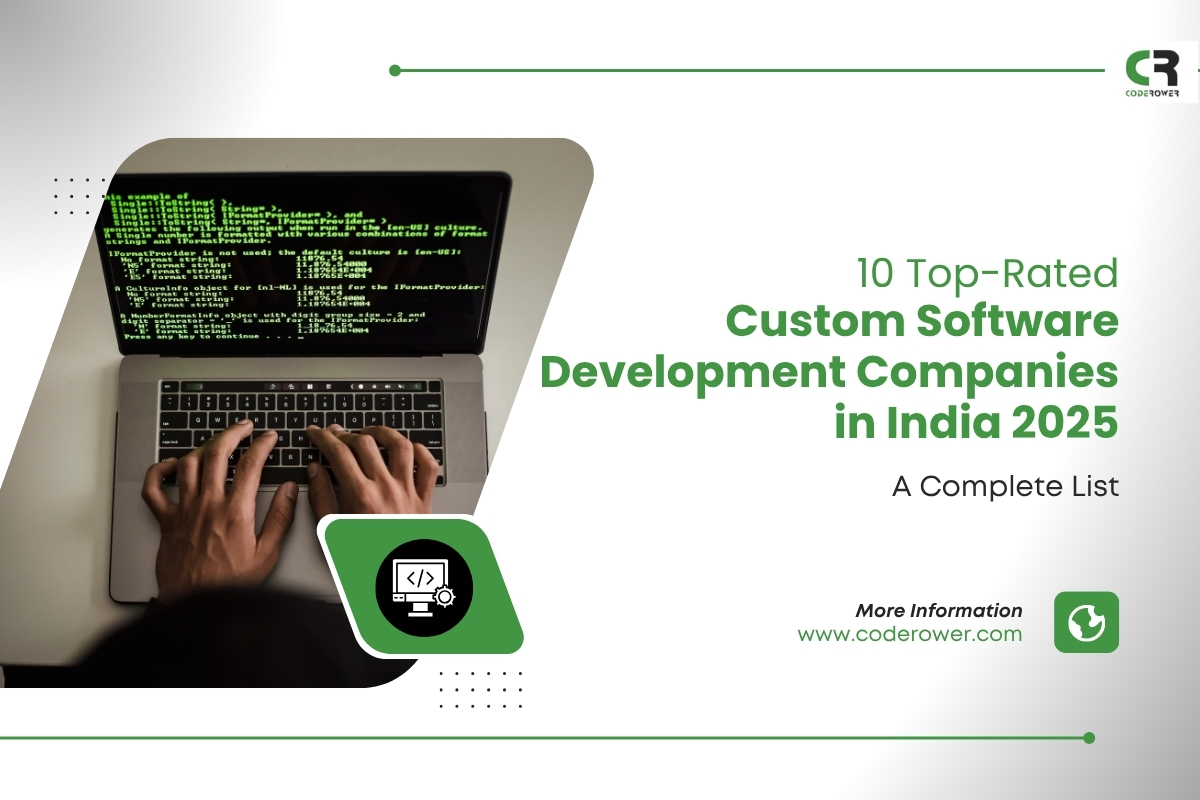
In the rapidly advancing world of technology, India has emerged as a global hub for custom software development, attracting businesses from around the globe. With a rich pool of talented developers, cost-effective solutions, and a commitment to quality, Indian software development companies offer unparalleled services. This blog highlights the top 10 custom software development companies in India for 2026, known for their innovation and excellence.
What is Custom Software?
Custom software (also known as bespoke software or tailored software) is a type of software solution designed specifically to meet the unique needs of a business or organization. Unlike off-the-shelf software, which serves a broad audience with general functionalities, custom software is built from scratch or modified to fit a company’s specific requirements.
What Stands Out About a Custom Software Development Company?
A custom software development company specializes in building tailored software solutions designed to meet a business’s unique needs. Unlike generic software providers, these companies focus on personalization, scalability, and innovation, helping businesses optimize their processes and gain a competitive advantage.
Key Factors That Make a Custom Software Development Company Stand Out
1. Tailored Solutions for Unique Business Needs
- Unlike off-the-shelf software, custom software is built from scratch to address specific business challenges.
- It is designed to align perfectly with a company’s workflow, goals, and objectives.
2. Expertise in Cutting-Edge Technologies
- A leading custom software company stays ahead with expertise in:
- AI & Machine Learning for automation and predictive analytics.
- Cloud Computing for scalable and secure solutions.
- Blockchain for secure transactions and data management.
- IoT (Internet of Things) for smart and connected applications.
- Low-code/No-code platforms for faster deployment.
3. Agile Development Approach
- Agile methodologies ensure faster development cycles, regular updates, and flexibility in incorporating changes.
- Companies that adopt Scrum, DevOps, or CI/CD (Continuous Integration/Continuous Deployment) deliver more efficient and error-free software.
4. Seamless Integration with Existing Systems
- A top-tier custom software firm ensures that the new software seamlessly integrates with ERP systems, CRMs, payment gateways, APIs, and third-party tools.
- This eliminates inefficiencies and enhances productivity across departments.
5. Focus on Security & Compliance
- Custom software development companies implement robust security measures such as:
- End-to-end encryption
- Multi-factor authentication (MFA)
- Role-based access control (RBAC)
- Secure API development
- They also ensure compliance with GDPR, HIPAA, PCI-DSS, and other industry regulations.
6. Scalable and Future-Proof Solutions
- Custom software is built with scalability in mind, allowing businesses to expand without performance issues.
- Companies ensure that applications can adapt to new technologies and user demands.
7. High-Quality User Experience (UX/UI)
- Top development companies prioritize intuitive design, fast load times, and smooth navigation.
- They focus on user research, wireframing, and testing to create engaging and functional applications.
8. Strong Post-Development Support & Maintenance
- Reliable firms provide ongoing maintenance, bug fixes, and performance updates.
- They offer 24/7 customer support and software upgrades to keep the system running smoothly.
Types of Custom Software Solutions
Custom software solutions are designed to cater to the unique needs of businesses across industries. They provide tailored functionalities, seamless integration, and enhanced efficiency that off-the-shelf software often lacks. Below are some of the most common types of custom software solutions:
1. Enterprise Software Solutions
Large-scale software applications are designed to manage and automate various business processes within an organization.
Examples:
- Enterprise Resource Planning (ERP) Software – Manages finance, HR, supply chain, and operations.
- Customer Relationship Management (CRM) Systems – Tracks customer interactions, sales, and marketing efforts.
- Business Process Automation Software – Automates repetitive business tasks to improve efficiency.
Industries: Manufacturing, Retail, Healthcare, Finance
2. E-Commerce Solutions
Custom-built platforms for online stores that require specific functionalities beyond standard e-commerce solutions.
Examples:
- Custom E-commerce Websites – Tailored platforms with advanced payment options and inventory management.
- Marketplace Platforms – Multi-vendor e-commerce systems like Amazon or Etsy.
- Subscription-Based E-commerce – Membership or recurring payment-based models (e.g., streaming services, online courses).
Industries: Retail, Fashion, Subscription Services
3. Healthcare Software Solutions
Software developed to manage patient records, enhance telemedicine, and ensure regulatory compliance.
Examples:
- Electronic Health Records (EHR/EMR) Software – Digital storage and management of patient health data.
- Telemedicine Applications – Online consultation platforms with video conferencing and prescription management.
- Hospital Management Systems – Software to manage appointments, billing, and patient care.
Industries: Hospitals, Clinics, HealthTech Startups
4. Financial & Banking Software
Custom solutions designed to handle transactions, risk management, and financial analytics.
Examples:
- FinTech Apps – AI-powered investment and trading applications.
- Banking Solutions – Secure digital banking systems with fraud detection.
- Billing & Invoicing Software – Automated invoicing, tax calculations, and financial reporting.
Industries: Banks, FinTech Startups, Insurance
5. Logistics & Supply Chain Software
Software designed to optimize transportation, inventory management, and supply chain processes.
Examples:
- Fleet Management Systems – Tracks vehicles, routes, and fuel consumption.
- Inventory & Warehouse Management – Automates stock tracking and order processing.
- Shipping & Freight Software – Custom solutions for managing logistics and deliveries.
Industries: E-commerce, Retail, Manufacturing, Shipping
6. Educational & E-Learning Software
Custom-built platforms that enhance digital learning experiences with personalized features.
Examples:
- Learning Management Systems (LMS) – Interactive platforms for online courses and training.
- Educational Apps – Mobile and web-based apps for self-paced learning.
- Corporate Training Software – Employee skill development and certification tracking.
Industries: Education, Corporate Training, EdTech Startups
7. Travel & Hospitality Software
Software that enhances booking, reservations, and guest management for travel businesses.
Examples:
- Hotel Booking Systems – Custom hotel management and reservation platforms.
- Travel Portals & Tour Operator Software – Online travel agencies (OTA) with itinerary planning.
- Restaurant POS Systems – Billing and order management software for restaurants.
Industries: Hotels, Travel Agencies, Restaurants
8. SaaS-Based Custom Solutions
Software-as-a-Service (SaaS) platforms tailored for specific business needs, accessible via the cloud.
Examples:
- Project Management Tools – Custom workflow and collaboration software (like Asana or Trello).
- HR & Payroll Software – Cloud-based employee management and payroll processing systems.
- Marketing Automation Software – Custom email, social media, and analytics tools.
Industries: Startups, Enterprises, Digital Agencies
9. Real Estate & Property Management Software
Software that streamlines property listings, sales, and tenant management.
Examples:
- Real Estate CRM – Helps realtors manage leads, property listings, and sales.
- Tenant & Lease Management Software – Automates rent collection, maintenance requests, and contracts.
- Smart Home Automation – Custom IoT-based applications for real estate projects.
Industries: Real Estate, Property Management
10. Gaming & Entertainment Software
Custom solutions for game development, media streaming, and interactive entertainment.
Examples:
- Game Development Software – Custom-built gaming applications for mobile, PC, or VR.
- Streaming Platforms – Custom-built video/music streaming services like Netflix or Spotify.
- Virtual Reality (VR) & Augmented Reality (AR) Apps – Interactive applications for gaming and business.
Industries: Gaming, Media & Entertainment
11. Blockchain & Crypto Solutions
Custom blockchain-based platforms designed for decentralized applications (DApps) and crypto transactions.
Examples:
- Cryptocurrency Wallets & Exchanges – Secure platforms for crypto transactions.
- Smart Contracts & Decentralized Applications (DApps) – Blockchain-based solutions for various industries.
- NFT Marketplaces – Custom-built platforms for buying, selling, and trading NFTs.
Industries: FinTech, Crypto, Web3 Startups
12. Custom AI & Machine Learning Solutions
AI-driven applications are designed to enhance business intelligence, automation, and decision-making.
Examples:
- Chatbots & Virtual Assistants – AI-powered customer support solutions.
- Predictive Analytics Software – Data-driven insights for business forecasting.
- AI-Based Image & Speech Recognition – Applications for security, healthcare, and automation.
Industries: Healthcare, FinTech, E-commerce, Manufacturing
10 Best Custom Software Development Companies in 2026
1. Aalpha Information Systems
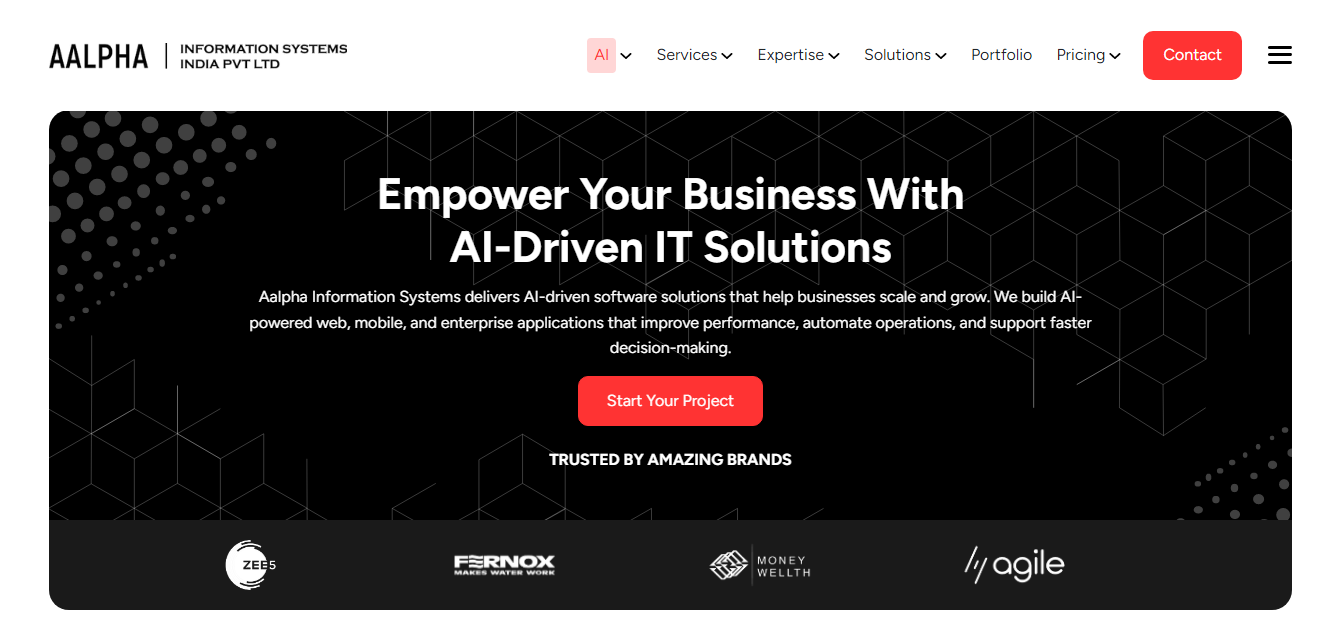
Aalpha Information Systems is a well-established custom software development company with over 20 years of experience delivering tailored digital solutions to global clients. The company specializes in building scalable, secure, and high-performance software aligned with specific business goals. With strong technical depth and a client-focused approach, Aalpha supports startups, SMEs, and enterprises across multiple domains, helping them build reliable products and modernize existing systems.
- Location: Bengaluru
- Services: Custom software development, web development, mobile app development, SaaS development, AI & ML solutions, cloud services
- Industries: Healthcare, FinTech, eCommerce, Logistics, Education, Manufacturing, Startups
- USP: Proven expertise in building custom software solutions for startups and enterprises
- Pricing: Starts at $5,000
2. Infosys

Infosys is a global leader in technology services and consulting, helping clients in over 50 countries to create and execute digital transformation strategies. Known for its strong focus on innovation and digital transformation, Infosys offers a wide array of services, including digital services, consulting, and IT services. Their industry expertise covers finance, healthcare, manufacturing, and retail, among others, making them a trusted partner for many leading enterprises.
- Location: Bangalore
- Services: Digital services, consulting, IT services
- Industries: Finance, Healthcare, Manufacturing, Retail, etc.
- Pricing: Contact for a quote
- USP: Renowned for innovation and robust digital transformation solutions
3. Wipro

Wipro is a prominent global information technology, consulting, and business process services company. With a commitment to sustainable practices and technology-driven solutions, Wipro serves clients across the healthcare, manufacturing, retail, and energy industries. Their offerings include IT services, consulting, and business process services, all designed to help businesses achieve their goals through innovative and efficient solutions.
- Location: Bangalore
- Services: IT services, consulting, business process services
- Industries: Healthcare, Manufacturing, Retail, Energy, etc.
- Pricing: Contact for a quote
- USP: Focuses on sustainability and technology-driven solutions
4. CONTUS Tech
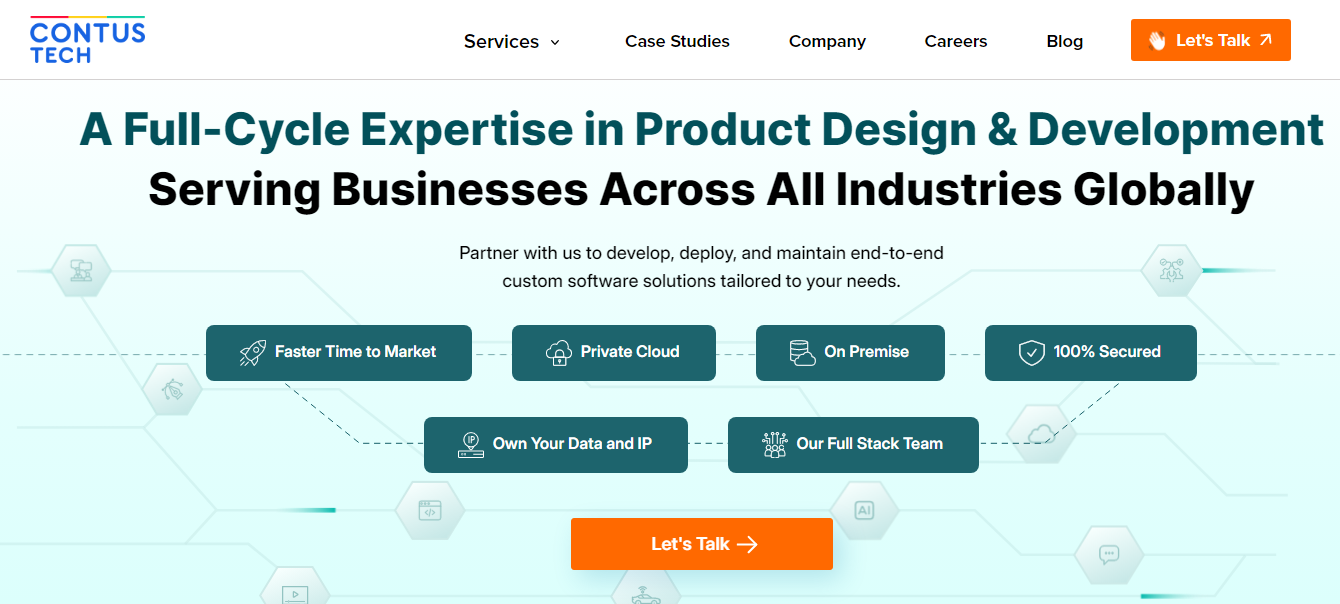
CONTUS Tech is a custom software company specializing in building software, modernizing, and AI-driven solutions. Known for its full product lifecycle support from consulting and MVP development to deployment and long-term support. With branches in India and the USA, CONTUS Tech works with startups and Fortune 500 companies worldwide and across multiple industries. Their quick turnarounds, AI-first approach, and 4.7 Clutch rating show consistency and reliability.
- Location: India and USA
- Services: Custom software development, AI development, AI agent development, Voice AI agent development, SaaS development, cloud and DevOps, product engineering
- Industries: Fintech, Healthcare, E-commerce, Entertainment, Education, Telecom, Automotive, Enterprise
- Pricing: Contact for a quote
- USP: End-to-end product and AI development and MVP delivery in 30 days.
5. Bpract Software Solutions
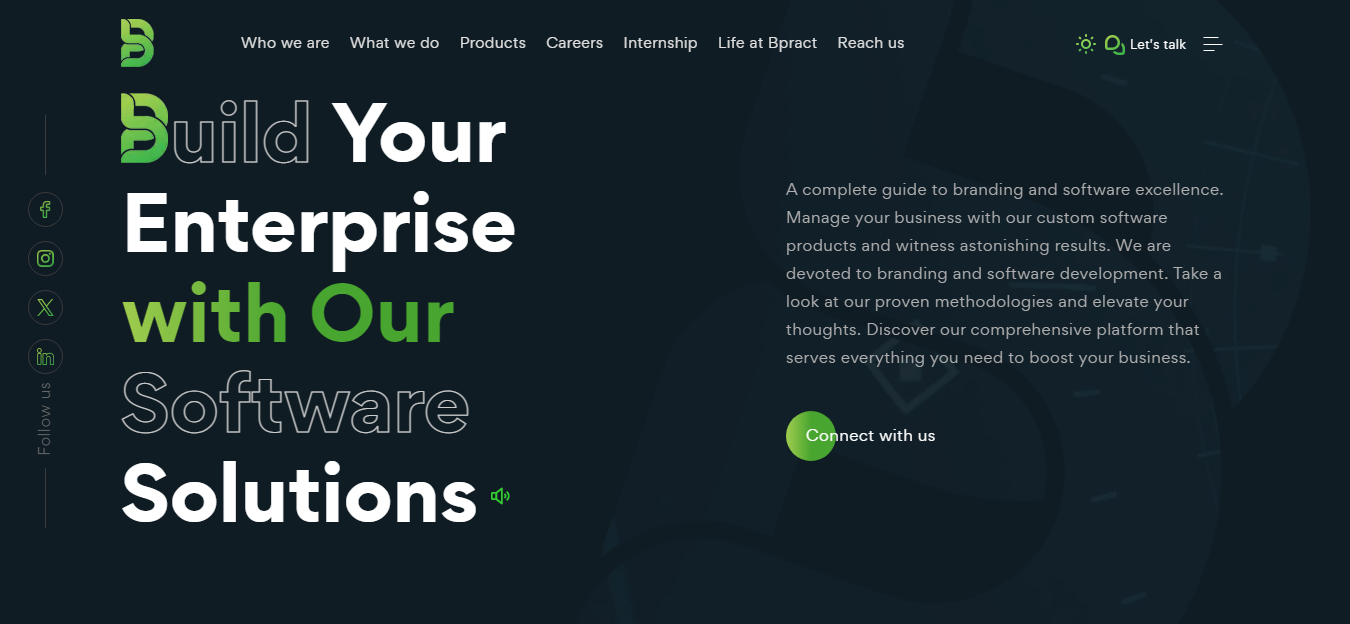
Bpract Software Solutions is a technology-driven software development company delivering scalable, custom digital solutions for startups and enterprises worldwide.
- Location: Calicut, Kerala, India
- Services: Custom Software Development, Web Application Development, Mobile App Development, UI/UX Design, Cloud-Based Solutions, Digital Marketing Services
- Industries: Information Technology, Healthcare, FinTech, E-commerce, Education, Logistics, Real Estate, etc.
- Pricing: Contact for a quote
- USP:
- Custom-built solutions aligned with business goals
- Experienced engineering and design teams
- Agile development with transparent communication
- Focus on scalability, performance, and long-term growth
6. CodeRower

CodeRower is a global technology consulting and services company that helps enterprises drive digital transformation. Known for its agile and collaborative approach, CodeRower offers IT services & consulting, digital transformation, and cloud services. They serve a variety of industries, including retail, finance, travel, and hospitality, delivering solutions that enhance business performance and customer experiences.
- Location: India, Sweden, Australia, Canada,
- Services: IT services & consulting, digital transformation, cloud services
- Industries: Retail, Finance, Hospitality, Education, E-commerce, Crypto, Gaming, Health & Fitness, Tour & Travel, etc.
- Pricing: Contact for a quote
- USP: Agile and collaborative approach to digital solutions
7. SolGuruz
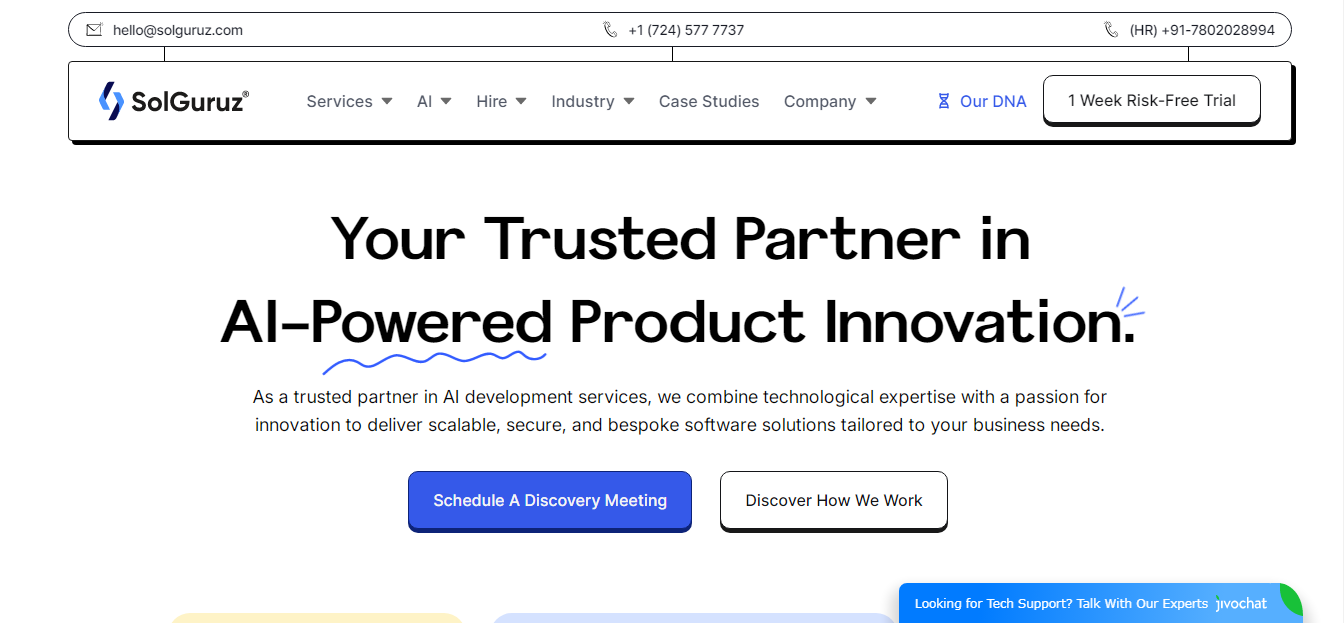
SolGuruz is a technology and product-based company aiming towards building high-end digitalised products and delivering solutions. The company has a strong focus on result-driven software development, allowing startups and enterprises to launch scalable applications with modern features.
With a problem-first approach, the company understands clients and works closely to analyse their goals and what tech stack they want. With an emphasis on performance, security, and maintainability, the team provides solutions that are easy to scale, manage, and evolve as business needs change. SolGuruz deploys a flexible model and is a strong partner for enterprises looking for fast pace, clarity, and long-term technical stability.
- Location: Gujarat
- Services: Custom software development, mobile and web application development, cloud-based solutions, API development, UI/UX design, technology consulting
- Industries: FinTech, Healthcare, Education, Logistics, Retail & E-commerce
- Pricing: Available on request
- USP: Business-aligned software development with a strong focus on performance, security, and maintainability
8. ValueCoders
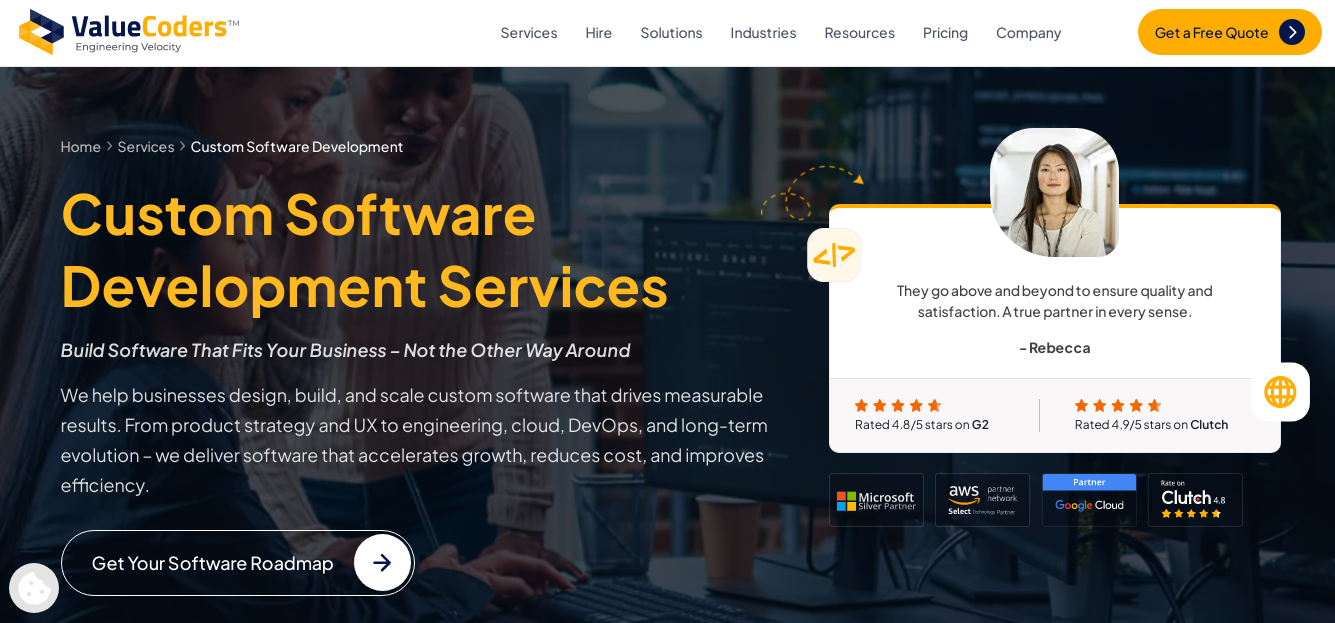
ValueCoders is a leading custom software development company that delivers tailored technology solutions to startups, SMBs, and enterprises worldwide. With a strong focus on engineering excellence, scalability, and innovation, ValueCoders helps businesses accelerate digital transformation across diverse industries. Their client-centric approach and flexible engagement models ensure high-quality, cost-effective software solutions that drive measurable business outcomes.
- Location: Gurugram, India
- Services: Custom software development, web & mobile app development, AI/ML solutions, cloud services, DevOps, software testing & QA, IT staff augmentation
- Industries: Healthcare, FinTech, E-commerce, Education, Travel & Hospitality, Manufacturing, Logistics, etc.
- Pricing: Contact for a quote
- USP: Agile-driven custom software development with a strong focus on scalability, quality, and cost efficiency
9. Tech Mahindra

Tech Mahindra is a leading provider of IT services, network technology solutions, and business process outsourcing. With a strong focus on innovation and customer-centric solutions, Tech Mahindra serves industries including telecommunications, healthcare, retail, and banking. Their services help businesses leverage the latest technologies to achieve their strategic objectives and enhance their competitive edge.
- Location: Pune
- Services: IT services, network technology solutions, business process outsourcing
- Industries: Telecommunications, Healthcare, Retail, Banking, etc.
- Pricing: Contact for a quote
- USP: Strong focus on innovation and customer-centric solutions
10. Cognizant

Cognizant is a global leader in IT services, consulting, and business process outsourcing. With a strong industry focus, Cognizant provides digital transformation services to clients in healthcare, finance, retail, and technology sectors. Their expertise in leveraging digital technologies to solve complex business challenges makes them a trusted partner for many leading companies.
- Location: Teaneck, NJ (India HQ in Chennai)
- Services: IT services, consulting, and business process outsourcing
- Industries: Healthcare, Finance, Retail, Technology, etc.
- Pricing: Contact for a quote
- USP: Known for its strong industry focus and digital transformation services
11. HCL Technologies

HCL Technologies is a global IT services company that offers a wide range of services, including IT and business services, engineering, and R&D. Known for its comprehensive technology solutions and global reach, HCL Technologies serves industries such as aerospace, banking, automotive, and healthcare. Their commitment to innovation and quality ensures that they deliver solutions that drive business success.
- Location: Noida
- Services: IT and business services, engineering, R&D
- Industries: Aerospace, Banking, Automotive, Healthcare, etc.
- Pricing: Contact for a quote
- USP: Comprehensive technology solutions with a global reach
12. L&T Infotech (LTI)

L&T Infotech (LTI) is a global IT services and solutions provider known for delivering comprehensive digital transformation solutions. With a presence in over 30 countries, LTI serves industries such as banking, finance, insurance, and energy. Their services include IT services, digital solutions, and consulting, all aimed at helping businesses achieve their strategic goals and drive innovation.
- Location: Mumbai
- Services: IT services, digital solutions, consulting
- Industries: Banking, Finance, Insurance, Energy, etc.
- Pricing: Contact for a quote
- USP: Delivers comprehensive digital transformation solutions
13. Hexaware Technologies

Hexaware Technologies is a leading provider of IT services, consulting, and business process services. With a strong focus on automation-led strategies, Hexaware serves industries including banking, finance, healthcare, and insurance. Their commitment to delivering high-quality and efficient solutions makes them a preferred partner for businesses seeking to optimize their operations and drive growth.
- Location: Mumbai
- Services: IT services, consulting, business process services
- Industries: Banking, Finance, Healthcare, Insurance, etc.
- Pricing: Contact for a quote
- USP: Pioneering automation-led strategies for IT and business services
14. Mphasis

Mphasis is a global IT services company specializing in digital solutions and business process services. With a focus on cloud and cognitive services, Mphasis helps clients in the banking, finance, healthcare, and insurance sectors achieve digital transformation. Their innovative approach and commitment to quality ensure that they deliver solutions that meet the unique needs of their clients.
- Location: Bangalore
- Services: IT services, digital solutions, and business process services
- Industries: Banking, Finance, Healthcare, Insurance, etc.
- Pricing: Contact for a quote
- USP: Focuses on cloud and cognitive services for digital transformation
15. Tata Consultancy Services (TCS)

Tata Consultancy Services (TCS) is one of the largest IT services companies globally, providing a comprehensive range of IT services, consulting, and business solutions. With a presence in over 46 countries, TCS offers innovative solutions that help businesses navigate the complexities of digital transformation. Their extensive expertise spans various industries, including banking, finance, healthcare, and retail, ensuring that they can cater to diverse business needs.
- Location: Mumbai
- Services: IT services, consulting, and business solutions
- Industries: Banking, Finance, Healthcare, Retail, etc.
- Pricing: Contact for a quote
- USP: Global leader with extensive expertise and a wide range of services
Benefits of Custom Software Development
Custom software development provides businesses with tailored solutions that align with their unique needs and goals. Unlike off-the-shelf software, custom-built applications offer greater flexibility, efficiency, and scalability. Here are the key benefits of investing in custom software development:
1. Tailored to Specific Business Needs
Custom software is designed to meet the exact requirements of a business, ensuring that all features and functionalities align with operations and workflows.
✅ Personalized user experience
✅ Industry-specific features
✅ No unnecessary functionalities
2. Scalability & Future-Proofing
As businesses grow, so do their software requirements. Custom software is built with scalability in mind, allowing for seamless upgrades and enhancements.
✅ Adapts to business growth
✅ Easily integrates new features
✅ Handles increased workloads efficiently
3. Enhanced Security & Data Protection
Off-the-shelf software is often targeted by hackers due to its widespread use. Custom solutions provide advanced security measures tailored to business needs.
✅ Stronger data encryption
✅ Compliance with industry regulations (e.g., GDPR, HIPAA)
✅ Reduced risk of security breaches
4. Cost-Effectiveness in the Long Run
While custom software may require a higher initial investment, it eliminates recurring licensing fees, costly third-party subscriptions, and unnecessary features.
✅ No dependency on third-party vendors
✅ Lower long-term maintenance costs
✅ No unnecessary feature expenses
5. Seamless Integration with Existing Systems
Custom software is designed to work smoothly with current business tools, eliminating compatibility issues and improving workflow efficiency.
✅ Connects with CRM, ERP, and other tools
✅ Enhances automation and data flow
✅ Reduces operational bottlenecks
6. Competitive Advantage
A unique software solution tailored to business needs gives companies an edge over competitors using generic solutions.
✅ Optimized business processes
✅ Better customer experience
✅ Greater operational efficiency
7. Improved Performance & Efficiency
Custom software eliminates unnecessary features and focuses on optimizing processes, leading to better performance and productivity.
✅ Faster processing speeds
✅ Streamlined workflows
✅ Automation of repetitive tasks
8. Full Ownership & Control
With custom software, businesses have complete control over updates, features, and security measures without depending on third-party vendors.
✅ No vendor lock-in
✅ Freedom to modify and update as needed
✅ Ownership of intellectual property
9. Personalized Customer Experience
Custom software can be designed to enhance customer interactions, providing a more engaging and user-friendly experience.
✅ Tailored UI/UX design
✅ Personalized customer support features
✅ Better data-driven decision-making
10. Better Maintenance & Support
Custom software developers provide dedicated support and maintenance, ensuring timely updates and bug fixes.
✅ Faster issue resolution
✅ Regular updates and optimizations
✅ Long-term reliability
Applications of Custom Software Development Across Industries
Custom software development plays a crucial role in various industries by providing tailored solutions that enhance efficiency, streamline operations, and improve customer experiences. Here’s how different industries leverage custom software to drive growth and innovation.
1. Healthcare
Custom software in healthcare enhances patient care, streamlines operations, and ensures regulatory compliance.
✅ Electronic Health Records (EHRs) – Secure patient data storage and management.
✅ Telemedicine Platforms – Virtual consultations and remote patient monitoring.
✅ Medical Billing & Claims Processing – Automated insurance claims and invoicing.
✅ Healthcare Analytics – Data-driven insights for better decision-making.
✅ Pharmacy Management Systems – Inventory tracking and prescription management.
2. Finance & Banking
Custom financial software improves security, automates processes, and enhances customer interactions.
✅ Core Banking Systems – Real-time account and transaction management.
✅ Fraud Detection & Prevention – AI-driven fraud monitoring systems.
✅ Custom ERP Solutions – Automated accounting and financial reporting.
✅ Mobile Banking & Payment Solutions – Secure digital transactions.
✅ Investment & Trading Platforms – AI-powered portfolio management.
3. Retail & E-Commerce
Retailers leverage custom software for personalized shopping experiences and efficient inventory management.
✅ E-Commerce Platforms – Custom-built online stores with advanced features.
✅ Inventory Management Systems – Automated stock tracking and forecasting.
✅ Customer Relationship Management (CRM) – Personalized marketing and customer insights.
✅ POS (Point of Sale) Systems – Secure and seamless in-store transactions.
✅ Loyalty & Rewards Programs – Customer engagement and retention solutions.
4. Education & E-Learning
Custom software in education enhances learning experiences and administration.
✅ Learning Management Systems (LMS) – Online courses and student tracking.
✅ Student Information Systems (SIS) – Enrollment, attendance, and grading.
✅ Virtual Classrooms & Video Conferencing – Live and recorded educational sessions.
✅ AI-Based Tutoring Systems – Personalized learning pathways.
✅ Examination & Assessment Portals – Secure online tests and grading.
5. Manufacturing & Supply Chain
Manufacturers use custom software to optimize production and logistics.
✅ ERP Solutions for Manufacturing – Automated production planning and scheduling.
✅ Supply Chain Management (SCM) – Real-time tracking and logistics optimization.
✅ IoT-Enabled Smart Manufacturing – Predictive maintenance and automation.
✅ Warehouse Management Systems (WMS) – Inventory control and order fulfillment.
✅ Vendor & Procurement Management – Efficient supplier coordination.
6. Logistics & Transportation
Custom software enhances fleet management and route optimization.
✅ Fleet Management Software – Real-time vehicle tracking and fuel management.
✅ Route Optimization Systems – AI-driven logistics planning.
✅ Freight & Cargo Management – Automated shipment tracking and invoicing.
✅ Last-Mile Delivery Solutions – Enhanced delivery efficiency.
✅ Custom TMS (Transportation Management System) – End-to-end logistics management.
7. Real Estate & Property Management
Real estate businesses benefit from custom solutions that streamline operations.
✅ Property Management Software – Lease tracking, maintenance, and rent collection.
✅ Real Estate CRM – Lead management and customer engagement.
✅ Virtual Tour & AR Solutions – 3D property viewing experiences.
✅ Automated Valuation Models (AVM) – AI-driven property pricing predictions.
✅ Tenant & Lease Management Systems – Secure online contracts and payments.
8. Hospitality & Travel
Custom software in hospitality enhances guest experiences and operational efficiency.
✅ Hotel Management Software – Room booking, staff management, and billing.
✅ Online Travel Booking Systems – Customizable travel and tour booking solutions.
✅ Guest Relationship Management – Personalized customer service and loyalty programs.
✅ AI-Powered Chatbots – 24/7 customer support for travel agencies and hotels.
✅ Revenue & Pricing Management – Dynamic pricing strategies.
9. Gaming & Entertainment
Custom software powers gaming platforms and digital content distribution.
✅ Game Development Software – Custom-built game engines and platforms.
✅ Streaming & OTT Platforms – Personalized content recommendation systems.
✅ Virtual & Augmented Reality (VR/AR) – Immersive gaming and entertainment experiences.
✅ Digital Rights Management (DRM) – Secure content distribution.
✅ AI-Driven Content Creation – Automated video editing and production tools.
10. Energy & Utilities
Energy companies use custom software for efficiency, monitoring, and compliance.
✅ Smart Grid Management – Real-time energy distribution monitoring.
✅ Renewable Energy Management – Solar and wind power optimization.
✅ Utility Billing Systems – Automated invoicing and payments.
✅ IoT-Based Asset Monitoring – Predictive maintenance for power plants.
✅ Energy Consumption Analytics – AI-driven efficiency reports.
How to Choose the Best Custom Software Development Company
Choosing the right custom software development company is crucial for the success of your project. The ideal company should align with your business goals, have the right expertise, and deliver a high-quality product within budget and timeline constraints. Here’s a step-by-step guide to help you make the best decision.
1. Define Your Business Requirements 📌
Before searching for a development partner, outline your project requirements clearly:
✅ Project Scope – Define the goals, features, and functionalities you need.
✅ Target Audience – Understand who will use the software and their pain points.
✅ Budget & Timeline – Set a realistic budget and timeline for development.
✅ Technology Preferences – Determine if you need a specific tech stack (e.g., Python, Java, React).
2. Evaluate the Company’s Experience & Expertise 🔍
The development company’s experience determines how well they can handle your project.
✅ Industry Experience – Choose a company with experience in your industry (e.g., healthcare, fintech).
✅ Portfolio & Case Studies – Review past projects to assess their quality and innovation.
✅ Technology Stack – Ensure they are proficient in modern technologies relevant to your project.
✅ Certifications & Partnerships – Look for industry-recognized certifications (e.g., ISO, AWS, Microsoft Partner).
3. Check Client Reviews & Testimonials ⭐
Client feedback provides valuable insights into the company’s credibility.
✅ Platforms to Check – Browse Clutch, GoodFirms, Trustpilot, and Google Reviews.
✅ Testimonials – Look for positive feedback about communication, delivery, and support.
✅ References – Request client references and contact them for firsthand experience.
4. Assess Development Process & Methodology ⚙️
A structured development process ensures smooth project execution.
✅ Agile Methodology – Look for Agile/Scrum methodologies for flexibility and iterative improvements.
✅ Requirement Gathering – Ensure they conduct in-depth discussions to understand your needs.
✅ Prototyping & Wireframing – Evaluate their approach to UI/UX design and usability.
✅ Quality Assurance (QA) – Check for rigorous testing (manual & automated) to eliminate bugs.
5. Consider Communication & Collaboration 📞
Effective communication is key to a successful partnership.
✅ Dedicated Project Manager – Ensures smooth coordination and progress updates.
✅ Communication Channels – Email, Slack, Microsoft Teams, or other preferred platforms.
✅ Time Zone & Availability – Check if their working hours align with yours.
✅ Language Proficiency – Ensure there are no language barriers.
6. Evaluate Post-Launch Support & Maintenance 🔄
Ongoing support ensures your software remains secure, updated, and efficient.
✅ Bug Fixes & Updates – Clarify their policy on fixing post-launch issues.
✅ Security Updates – Ensure regular security patches and compliance checks.
✅ Scaling & Enhancements – Discuss how they handle future upgrades.
✅ SLA (Service Level Agreement) – Get a clear contract outlining post-deployment services.
7. Compare Pricing & Cost Transparency 💰
A reliable company provides clear pricing structures with no hidden costs.
✅ Fixed Price Model – Best for well-defined projects with clear requirements.
✅ Time & Material Model – Ideal for flexible projects where requirements may change.
✅ Dedicated Team Model – Suitable for long-term projects needing full-time developers.
✅ Hidden Costs – Ensure there are no unexpected charges for revisions or support.
8. Ensure Security & Compliance Standards 🔒
Your software must be secure and compliant with industry regulations.
✅ Data Protection Policies – Check GDPR, HIPAA, or other relevant compliance adherence.
✅ Code Security – Ask about encryption, authentication, and other security protocols.
✅ Intellectual Property (IP) Rights – Confirm ownership of the final product’s source code.
9. Request a Proof of Concept (PoC) or MVP 🚀
A Proof of Concept (PoC) or Minimum Viable Product (MVP) can validate the company’s capabilities before full-scale development.
✅ PoC – A small-scale prototype demonstrating technical feasibility.
✅ MVP – A working version with core features to test market response.
10. Choose a Partner, Not Just a Vendor 🤝
A good development company understands your vision and works as a long-term technology partner.
✅ Innovation-Driven Approach – They should suggest improvements, not just follow instructions.
✅ Scalability – Ensure they can handle future expansion needs.
✅ Long-Term Collaboration – Look for a company willing to grow with your business.
Conclusion
Choosing the right custom software development company in India is crucial for businesses aiming to stay ahead in the competitive market. The companies listed above have proven their expertise and commitment to delivering high-quality solutions tailored to meet the unique needs of their clients. Whether you are looking to develop a new software solution or optimize your existing systems, these developers offer a range of services that can help you achieve your business goals. Among them, CodeRower stands out for its agile and collaborative approach, ensuring businesses not only achieve their goals but also drive innovation and enhance customer experiences. Whether you are looking to develop a new software solution or optimize your existing systems, these developers offer a range of services that can help you achieve your business goals.
 +91 971 1141 179 ,
+91 971 1141 179 ,